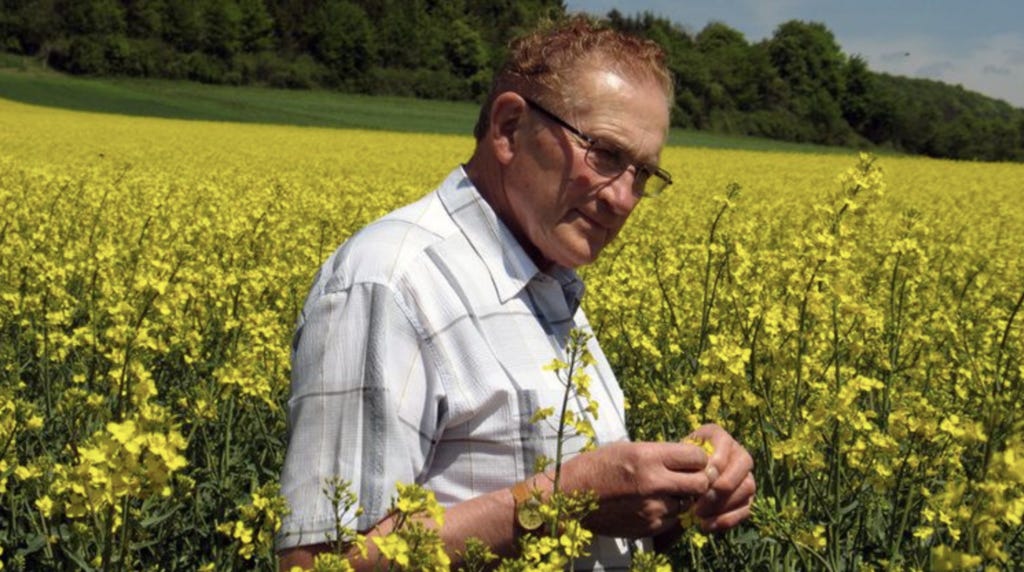Farmers & Seed Sovereignty Movements
Empowering Farmers Against Corporate Threats
Introduction
The ability to save and plant seeds is one of the oldest agricultural practices, deeply tied to farmers' autonomy and food sovereignty. Yet, corporations like Monsanto (now part of Bayer) have used patents, contracts, and lawsuits to control seeds, threatening farmers who save their own. This article aims to empower farmers with knowledge, resources, and strategies to protect their rights and livelihoods.
Bill Mollison On The Hijacking Of Our Seed Supplies
Bill Mollison is the co-creator of Permaculture; along with David Holmgren. This is an excerpt from a speech he gave many years ago, warnings which, sadly, went largely ignored. “While we were setting up the Permaculture system*, around four companies, ICI and a couple of others and some Shell companies, frankly, took out of the whole of the world seed supply. They bought out all Seedsmen, of any note. They then proceeded to patent seeds. Of the seed, patented, that is, they held 100% of patents between these, about 80% of the patents on foods and cereals. This largely went unnoticed by the people of most countries, we've seen a 400% rise since that time in the price of seeds. That happened without notice from the Australian public, and indeed from the public of any country, and the consequence is that only four companies now really control the whole of the seed supply of the world.”
Bill Mollison’s actual words can be heard here, this is an old recording so is not of the best fidelity, however, his words are discernable.
*Bearing in mind that they were setting up Permaculture in the late 1970’s.
1. Understanding the Problem: Corporate Control Over Seeds
Legal Pressure: Farmers in the Crosshairs
Corporations use aggressive legal tactics to enforce their patents, often targeting small farmers who lack the resources to fight back. This legal pressure creates a climate of fear and discourages traditional seed-saving practices.
How Legal Pressure Works
Monitoring and Investigations: Companies employ field inspectors, private investigators, and even drone technology to monitor fields for unauthorized use of patented seeds.
Litigation as a Tool: Farmers accused of patent infringement face lawsuits that can be financially and emotionally devastating. Even if the farmers win, the cost of legal defense can bankrupt them.
Settlements: Many farmers, unable to afford prolonged legal battles, are forced to settle out of court, often agreeing to pay large sums or sign restrictive agreements.
Cross-Pollination Issues
One of the most controversial aspects of these lawsuits is that farmers can be held liable even if patented seeds unintentionally end up in their fields through cross-pollination or seed drift.
Example: Canadian farmer Percy Schmeiser became a global symbol of this issue. Monsanto sued him after their patented canola seeds were found growing on his land, likely due to wind or pollinators carrying them from neighboring farms. Although Schmeiser didn’t plant the seeds intentionally, the court ruled in Monsanto’s favor. Sadly he passed away at the age of 89, here is a retrospective on his life.
The Broader Implications of Legal Pressure
Stifling Seed Saving
The fear of lawsuits prevents farmers from engaging in seed-saving practices, even with non-GMO crops, as cross-pollination could lead to contamination and legal disputes. We also address the aspect of Landrace seed evolution in this article.
Loss of Agricultural Knowledge
Seed saving is not just an economic practice but also a way to preserve traditional knowledge and biodiversity. Legal pressure disrupts this cultural continuity, pushing farmers toward dependence on industrial agriculture.
This is a wonderful book on some of the traditional foods and seeds that are much less evident today. “While offering a eulogy to a once-common game food that has gone extinct—the passenger pigeon—the book (Renewing America’s Food Traditions) doesn’t dwell on tragic losses. Instead, it highlights the success stories of food recovery, habitat restoration, and market revitalization that chefs, farmers, ranchers, fishermen, and foresters have recently achieved. Through such “food parables,” editor Gary Paul Nabhan and his colleagues build a persuasive argument for eater-based conservation.”
Economic Vulnerability
Farmers often operate on thin profit margins, and the additional cost of legal disputes or settling with corporations can tip them into financial ruin. This consolidation of power further marginalizes small and medium-sized farmers.
To make matters worse in this regard, the U.S. Farm Bill, a comprehensive piece of legislation governing agricultural and food policy, is typically renewed every five years. The most recent Farm Bill, enacted in 2018, expired on September 30, 2023. To prevent a lapse in critical programs, Congress extended the 2018 Farm Bill until September 30, 2024.
As of November 12, 2024, Congress has not yet passed a new Farm Bill to replace the expired 2018 legislation. This delay has raised concerns among farmers, commodity groups, and policymakers about the continuity of essential agricultural programs. Over 300 U.S. farm and commodity groups have urged Congress to pass a new Farm Bill before the year's end to assist farmers facing high costs and challenging conditions.
The delay in passing a new Farm Bill has significant implications:
Agricultural Programs: Many programs, including crop insurance, conservation initiatives, and disaster relief, face uncertainty without reauthorization.
Nutrition Assistance: Programs like the Supplemental Nutrition Assistance Program (SNAP) depend on Farm Bill provisions for funding and guidelines.
Rural Development: Initiatives aimed at supporting rural infrastructure and economic development are in limbo.
In summary, the U.S. Farm Bill, last enacted in 2018, expired on September 30, 2023, and was extended until September 30, 2024. As of November 12, 2024, a new Farm Bill has not been passed, leading to concerns about the continuity of vital agricultural and nutrition programs.
Addressing the Issue
Policy Change
Advocacy for legislation that bans or restricts patents on seeds, particularly in cases of natural traits or accidental cross-pollination, is crucial.
Countries like India have pushed back on biopiracy through laws like the Protection of Plant Varieties and Farmers’ Rights Act, which recognizes farmers’ rights to save and exchange seeds.
Grassroots Resistance
Farmers’ cooperatives and legal networks, such as the Center for Food Safety, are vital in defending against corporate lawsuits and advocating for more equitable systems.
Community Seed Banks: Preserving and exchanging non-GMO and heirloom seeds can help protect traditional practices and reduce dependence on patented seeds. Of course we are incredibly active in this realm and here we detail how we created and maintain our expanding seed bank in Cascadia in the USA.
Education and Awareness
Farmers need accessible legal resources and workshops to understand their rights and mitigate risks. Raising public awareness about these issues can increase consumer support for farmer-led movements. In the next section we will identify some resources available now to assist our farmers in redressing the unfair burdens placed on them.
Why Accessible Legal Resources Are Critical
The legal landscape around seed patents, cross-pollination disputes, and corporate contracts is complex and heavily weighted in favor of large corporations. Farmers, who often have limited financial and legal expertise, need tailored resources to navigate this terrain effectively.
Key challenges farmers face include:
Cost of Legal Defense: Hiring lawyers with expertise in agricultural or intellectual property law is prohibitively expensive for most small farmers.
Lack of Awareness: Many farmers are unaware of the legal risks associated with using patented seeds or of their rights in disputes.
Fear of Retaliation: Facing lawsuits from multinational corporations can feel overwhelming, leading many farmers to settle out of court even when they have a strong case.
Existing Organizations Offering Legal Support to Farmers
Several organizations provide direct legal aid, advocacy, and educational resources to help farmers protect their rights:
Farmers’ Legal Action Group (FLAG)
What They Do: FLAG is a nonprofit law center dedicated to providing legal services to family farmers and promoting sustainable agriculture.
Services: They offer legal consultations, educational materials, and workshops on agricultural law, including issues around seed patents and corporate lawsuits.
Resources: FLAG publishes free guides on topics like contract negotiations and understanding intellectual property laws.
Center for Food Safety (CFS)
What They Do: CFS advocates for food systems that prioritize farmers and the environment, with a focus on challenging corporate control over agriculture.
Legal Advocacy: CFS has a history of defending farmers in court against lawsuits related to GMO contamination and patents.
Policy Work: They work to advance policies that protect farmers from legal harassment and promote seed sovereignty.
Farm Aid
What They Do: Farm Aid provides financial and legal support to farmers in crisis, including those facing lawsuits or contract disputes.
Hotline Service: Their hotline connects farmers to legal and financial resources tailored to their needs.
Rural Advancement Foundation International (RAFI-USA)
What They Do: RAFI-USA supports farmers by offering legal resources and advocating for equitable agricultural systems.
Initiatives: They help farmers understand their contracts with seed companies and provide guidance on dispute resolution.
Seed Freedom Network
What They Do: This global network, led by Navdanya International, supports seed sovereignty movements and provides farmers with resources to resist corporate pressure.
Educational Campaigns: They focus on empowering farmers with knowledge about their rights and alternative farming practices.
Friends Of Family Farmers (FOFF)
What They Do: Friends of Family Farmers envisions a local, diversified, and interconnected agricultural future built by small and mid-size farms where people, animals, communities and ecosystems thrive, and equitable policies improve lives and land for Oregonians.
Legal Strategies Farmers Can Use
Understand Contracts Before Signing
Farmers should never sign agreements with seed companies without fully understanding the terms.
Seek legal advice to clarify obligations, including restrictions on seed saving, replanting, or sharing.
Document Farming Practices
Keeping records of planting, harvesting, and seed purchases is essential to defending against claims of patent infringement.
Evidence of sourcing non-GMO or open-pollinated seeds can help farmers refute false accusations.
Community Legal Funds
Farmers can pool resources to establish community legal defense funds.
These funds can be used to hire specialized attorneys when corporate lawsuits arise.
Join Legal Defense Networks
Farmers can join networks that offer group membership benefits, such as access to legal experts or insurance against lawsuits.
Example: Some cooperatives and unions provide members with legal aid as part of their services.
Advocate for Policy Change
Farmers can work with legal organizations and advocacy groups to push for policy reforms, such as banning patents on naturally occurring genetic traits or creating public funds to support farmers in legal disputes.
Educational Resources for Farmers
Many organizations publish free or low-cost guides, manuals, and templates to help farmers understand their rights and obligations. Here are some examples:
"The Farmer’s Guide to GMOs" (Center for Food Safety)
Covers the basics of GMO technology, patents, and how farmers can protect themselves legally.
FLAG’s Legal Guides
Topics include understanding agricultural contracts, managing debt, and handling corporate disputes.
Seed Sovereignty Toolkits
Provided by groups like Navdanya International and Seed Savers Exchange, these toolkits combine legal advice with practical strategies for seed saving and landrace growing.
Collaborative Approaches to Legal Support
Pro Bono Legal Clinics
Universities with agricultural law programs often provide free legal clinics for farmers.
Example: The Drake University Agricultural Law Center offers support to Iowa farmers.
Regional Advocacy Groups
Local organizations often provide legal workshops tailored to the needs of specific farming communities.
Example: The Northeast Organic Farming Association (NOFA) offers training on legal risks and seed-saving practices.
Global Advocacy Movements
Movements like the Open Source Seed Initiative (OSSI) provide seeds and legal frameworks that farmers can use to resist corporate claims.
Call to Action: Strengthen Legal Support for Farmers
The fight for seed sovereignty requires collective action to ensure farmers have the legal tools and resources to stand up against corporate pressures. By supporting legal aid organizations, participating in advocacy efforts, and creating grassroots legal networks, farmers and their allies can reclaim autonomy over seeds and farming practices.
As always, thank you very much for reading this latest article.








Farmers worldwide are fighting to preserve seed sovereignty and biodiversity 🌾. From heirloom maize to traditional grains, these seeds hold the key to resilient, sustainable agriculture.
🌽 Here is a small but potentially powerful step: Celebrate diversity and stand with farmers—sign the petition to expand the maize emoji! https://www.change.org/maize-emoji #SeedFreedom #Biodiversity